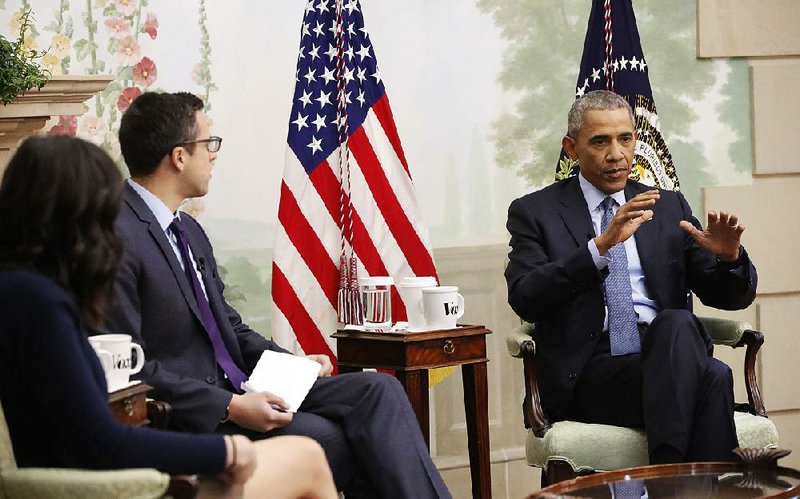WASHINGTON -- President Barack Obama pledged Friday to publicly support repealing the Patient Protection and Affordable Care Act if Republicans come up with something better, but he cast doubt on the GOP's ability to develop a viable alternative.
Obama implored GOP lawmakers not to pursue a two-step approach where the Affordable Care Act is repealed first and replaced after -- perhaps years later. He sought to lay the groundwork for Democrats to pile on Republicans for taking health care away from millions of people if the replacement never materializes.
"I am saying to every Republican right now: If you, in fact, can put a plan together that is demonstrably better than what Obamacare is doing, I will publicly support repealing Obamacare and replacing it with your plan," Obama said in a live-streamed interview with online news site Vox. "But I want to see it first."
Though Republicans are in agreement that the law should be repealed and replaced, they're at odds over what the replacement should look like, and particularly over how to pay for popular elements they hope to preserve, including coverage for pre-existing conditions and the ability for parents to keep children on their plans until age 26.
Republicans are discussing a repeal that wouldn't take effect for 18 months or longer, during which they'd ostensibly agree on a replacement.
"Republicans have to go ahead and show their cards, if in fact they have a program that would genuinely work better," Obama said.
"What you don't want is a situation where they make a promise they can't keep," he added. "I've worked on this a long time. If we had had a better way to do this, we would have done it. It would have been in my interest to do it, because I knew I was going to be judged on whether or not it worked."
The president argued he had no "pride of authorship" over the law, adding that it wasn't he who had dubbed it "Obamacare." He tried to dispel the notion he was trying to prevent a repeal in hopes of preserving his own legacy.
"They can call it whatever they want," Obama said. "They can call it Trumpcare or McConnellcare or Ryancare," Obama said, referring to President-elect Donald Trump, Senate Majority Leader Mitch McConnell and House Speaker Paul Ryan. "If it actually works, I will be the first one to say, 'Great.'"
Signed into law in 2010, the health care overhaul has extended insurance coverage to 20 million more people and dropped the uninsured rate to a historic low of about 9 percent, reshaping the $3 trillion-per-year health system in the process. Still, the law has failed to win broad public approval, amid persistent concerns about rising premium rates through the insurance marketplaces the law created.
Republicans have set a goal to offer "universal access," but their replacement may cover fewer people than Obama's overhaul. A key GOP focus is to do away with the individual mandate requirement that all Americans have insurance or pay a fine. Absent that requirement, insurers have warned it's not financially viable to force them to accept people regardless of pre-existing health issues.
In his final days in office, Obama has been ramping up a public push to pressure Republicans over their repeal plans and unite Democrats behind a strategy to try to protect the law. He traveled Wednesday to Capitol Hill to strategize with Democratic lawmakers, and penned an opinion piece published Friday in The New England Journal of Medicine.
In the article, Obama said the uncertainty of a repeal with no replacement could lead insurance companies to bail on the health care marketplaces during the phaseout years, leaving millions without insurance. He said it would set up a "cliff" with harmful consequences if lawmakers fail to approve a replacement in time.
Yet Trump's team has said repeal is the first order of business, and leaders in Congress hope to deliver a bill voiding much of the law by late February. Although Ryan said this week that lawmakers will vote on a replacement this year as well, it's unclear how Republicans could move that quickly to replace a law that took more than a year to craft.
Democrats have emphasized broader changes that the Affordable Care Act made to health insurance. The law prohibits insurers from denying coverage to sick people or charging them more. It also removed annual and lifetime limits on how much care insurers would cover. Trump has said he wants to preserve some of these popular features of the law.
Trump, on Twitter, has warned his fellow Republicans about their approach to the Affordable Care Act and said they should make sure Democrats take the blame for high premiums.
"Republicans must be careful in that the Dems own the failed ObamaCare disaster," Trump tweeted Wednesday. "It will fall of its own weight - be careful!"
Information for this article was contributed by Josh Lederman, Catherine Lucey, Ken Thomas and Ricardo Alonso-Zaldivar of The Associated Press and by Zachary Tracer, Anna Edney and Katherine Greifeld of Bloomberg News.
A Section on 01/07/2017
